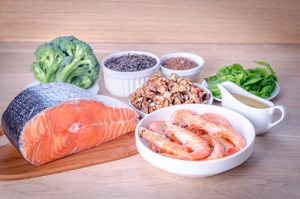 Crohn’s disease is linked to dietary fat and specific fatty acids may worsen the disease. Some research suggests that some omega-3 fatty acids can relieve Crohn’s disease, but more recent findings from Duke University have set to examine the role that omega-6 and omega-7 play in Crohn’s disease.
Crohn’s disease is linked to dietary fat and specific fatty acids may worsen the disease. Some research suggests that some omega-3 fatty acids can relieve Crohn’s disease, but more recent findings from Duke University have set to examine the role that omega-6 and omega-7 play in Crohn’s disease.
Assistant professor of molecular genetics and microbiology, Dennis Ko said, “Dietary therapies for Crohn’s disease should be examined more systematically, and this study provides a good first step.”
Advertisement
Some studies have linked high-fat diets with Crohn’s disease, but the two have never been joined through genetics. Certain gene variations have been seen in Crohn’s disease patients and specific variations are linked to higher fatty acids in the bloodstream.
The researchers identified genetic overlaps between palmitoleic acid, a type of omega-7 fatty acid, and Crohn’s with a software tool they call CPAG (Cross-Phenotype Analysis of GWAS). The software allowed for comparisons of 1,400 genome-wide variations that have been published up until now.
Ko said, “The basis of the approach is simply to ask, ‘Is the [genetic] overlap between the two diseases or traits more than you’d expect just by chance?’”
The researchers used zebrafish models of Crohn’s disease to test whether certain fatty acids trigger the disease.
Omega-7 itself did not worsen Crohn’s disease, but palmitic acid – found in olive oil, butter, cheese, and milk – did.
Present in vegetable oils, omega-6 was found to reduce inflammation in the fish, and in previous studies low omega-6 levels have been found in Crohn’s disease patients.
Advertisement
Ko does not suggest that patients should begin changing their diet to incorporate certain foods and remove others. He suggests further research is required before any recommendations can be made.
Best and worst foods for Crohn’s disease
Crohn’s disease in an inflammatory bowel disease and can cause symptoms such as bloating, abdominal pain, constipation, and diarrhea. Knowing what to eat and what to avoid is important as it can have a large effect on symptoms. Below are the worst and best foods for Crohn’s disease.
Worst foods for Crohn’s disease
- Alcohol
- Butter, mayonnaise, margarine, oils
- Carbonated beverages
- Coffee, tea
- Dairy products
- Fatty, fried foods
- Gas-producing foods like beans
- Nuts and seeds
- Raw fruit
- Raw vegetable
- Red meat and pork
- Spicy foods
- Whole grains and brans
Although not all of these foods will cause a reaction, these are just common trigger foods to keep in mind when choosing what to eat.
Best foods for Crohn’s disease
- White bread, crackers, pasta, rice
- Cooked fruits and vegetables
- Eggs
- Fish
- Lean ground beef
- Peanut butter – not crunchy, only smooth
- White meat poultry
- Tofu
- Dairy substitutes like almond or soy milk products
- Water
- Numeric
